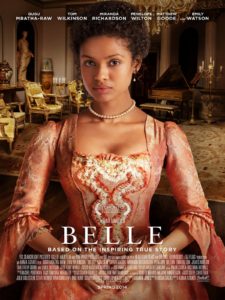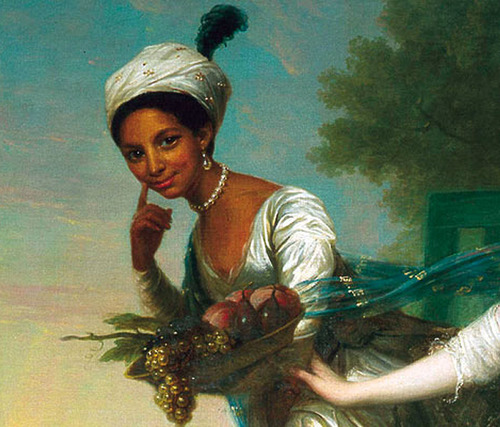A Beautiful And Romantic Tale, Beautifully Told
DIRECTOR: AMMA ASANTE/2014
 Belle is the story of Dido Elizabeth Belle (Gugu Mbatha-Raw), born in 1761 as the illegitimate daughter of an admiral in the British Royal Navy, by an African slave. She was a woman with a distinctive struggle to find her place in the world—as a mixed-race individual (inaccurately referred to as “mulatto” in the common parlance of the time), she looked like a slave in a time where her people were robbed of their freedom and dignity based on nothing but the colour of their skin. As an 18th-century woman, she had to function in a patriarchal society where women could not provide for themselves and had to depend on finding a husband to survive both financially and socially.
Belle is the story of Dido Elizabeth Belle (Gugu Mbatha-Raw), born in 1761 as the illegitimate daughter of an admiral in the British Royal Navy, by an African slave. She was a woman with a distinctive struggle to find her place in the world—as a mixed-race individual (inaccurately referred to as “mulatto” in the common parlance of the time), she looked like a slave in a time where her people were robbed of their freedom and dignity based on nothing but the colour of their skin. As an 18th-century woman, she had to function in a patriarchal society where women could not provide for themselves and had to depend on finding a husband to survive both financially and socially.
Little is certain regarding the details of Dido’s actual life. The movie is mostly inspired by a painting of Dido and Elizabeth that now hangs in at Scotland’s Scone Palace—especially notable for being one of the first portraits to portray a white and black subject as equals. This was practically unheard of in the 18th century, but it sums up Dido’s unique situation quite well.
An aristocrat by rank and right of her paternal bloodline, her station afforded her a social standing higher than of her white peers. Yet at the same time, her darker skin tone put her at odds with the racial prejudices of the day. Furthermore, her gender meant that there was little she could do to advance or navigate her position. Yet the new film Belle, based loosely on her life (of which little is authoritatively known), paints a portrait of a strong woman of colour who does not remain passive—and it does so largely without being anachronistic or transcribing 21st-century values onto an 18th-century setting.
We first meet Dido as a child, in the moment where she first meets her father, Sir John Lindsay (Matthew Goode). Her mother has died, and Sir Lindsay has come to retrieve his daughter and bring her to the Kenwood Estate, which is presided over by his uncle, William Murray (Tom Wilkinson). Unfortunately, Sir Lindsay’s duties in service of the Crown have kept him away at sea, and will continue to do so, necessitating that he cannot raise his daughter himself. In spite of this, it is clear that he loves her dearly, as he did her mother.
Murray, the 1st Earl of Mansfield and Lord Chief Justice of England and Wales, is at first reluctant to take her in, fearing the social ramifications for both him and his other great-niece, the Lady Elizabeth Murray (Sarah Gadon). But like his nephew, he is a good man at heart, and he and his wife (Emily Watson) soon come to love Dido as if she were their own. She is raised alongside her cousin, and they grow up together as sisters and the best of friends.
 When the girls come of age, it becomes time to plan for their future, which at the time meant finding a husband. At this point, Belle becomes much like a real-life Jane Austen story, as the girls must navigate the treacherous waters of courtship among the English landed gentry. The onus is upon them to each find a suitable match—for Elizabeth, abandoned by her father with no dowry for marriage, this means a husband of means who will provide for her. Dido, on the other hand, who gained a sizeable inheritance from her father after he was lost at sea, is encouraged to find a husband of standing who will elevate her own social rank, or at least not diminish it.
When the girls come of age, it becomes time to plan for their future, which at the time meant finding a husband. At this point, Belle becomes much like a real-life Jane Austen story, as the girls must navigate the treacherous waters of courtship among the English landed gentry. The onus is upon them to each find a suitable match—for Elizabeth, abandoned by her father with no dowry for marriage, this means a husband of means who will provide for her. Dido, on the other hand, who gained a sizeable inheritance from her father after he was lost at sea, is encouraged to find a husband of standing who will elevate her own social rank, or at least not diminish it.
Yet both girls are at significant disadvantages. Elizabeth’s poverty has made her somewhat undesirable according to the social mores of the day. Because Dido is a black woman, the Lord and Lady Mansfield fear that no gentleman of standing will wish to marry her either. Yet this does not stop them from trying.
Belle very much succeeds here on the basis of well-written and well-performed characters. The relationship between the sisters feels real and tangible, and we are quickly invested in their plight.
Mbatha-Raw radiates a plucky verisimilitude as the title character. “Belle” means beauty, and Mbatha-Raw excels at this—meaning not that she is simply physically beautiful (although she certainly is), but that her performance allows Dido’s own inner beauty to shine forth onto the screen, causing you to fall in love with her over the course of the film, even as she begins to slowly fall in love herself.
The eventual object of her affections is John Davinier (Sam Reid), a young aspiring lawyer and the son of a clergyman. As a gentlewoman, she first finds his unfamiliarity with the standards of aristocratic etiquette off-putting. Yet he is also a man with great strength of conviction and character. Davinier has come to Kenwood in order to seek mentoring in the law from Lord Mansfield. He is especially invested in the case upon which Mansfield is currently deliberating—a case that will prove crucial to the abolitionist movement, of which Davinier is a vocal proponent. Mansfield’s eventual ruling will have a great effect on the cause; either setting it back or advancing it.
For his part, Mansfield has attempted to keep his great-niece sheltered from such matters, but Davinier’s idealistic passion is making that more and more difficult, as Dido learns of the case and becomes heavily invested in its outcome. She begins to investigate the evidence herself, meeting in secret with Davinier, much to the chagrin of her great-uncle, who believes that Davinier, having no title or inheritance to speak of, will lower Dido’s own social standing.
This story of social and political progress in a civilized society intersected with a Jane Austen-type love story might seem clunky in the hands of lesser filmmakers, but writer Misan Sagay (Their Eyes Were Watching God) and director Amma Asante (A Way of Life) have crafted a film that effortlessly weaves Dido’s personal journey in with the greater fates of institutionalized slavery and abolitionism. It is a credit to Sagay and Asante that the story does not feel forced but rather flows naturally out of character traits and motivations, giving us a period romance with a strong sense of national social conscience. Not only that, but this is a powerful story of a strong woman of colour that is powerfully told by strong women of colour, who together give life to a movie that earns with interest the tears it jerks from the audience. Poignant and earnest, Belle seizes the heart with both hands and never lets go.

